Connectivity and Community Reflected In Julie, Monster
Written by Jessica Harika on behalf of the Production Team
Why do we go to the opera? We hear this question bounced around season planning meetings or as we petition for grant money/funding. And while we can ramble off statistics about music improving math scores of school age children, or healing adult illness and trauma, the real reason we find ourselves at the opera is human connectivity. From the beginning of time humans have craved the innate connection found through storytelling: our lives, thoughts, and feelings reflected back at us through a shared, common experience. It is what sets us apart from other species and is what’s responsible for that magical, carbonated feeling you get in your chest when you watch a live performance. Scientists have even found evidence of the molecules in our body realigning during a live performance. We are quite literally changed by seeing a live performance. But what if you never see yourself reflected back?
This is the intriguing position in which we find ourselves as theater-makers in the 21st century. The sexual revolution was 60 years ago, yet we find sex workers still at odds with the government. The first Pride riot happened during the Summer of Love thanks to the heroic deeds of a Black, trans woman. And still, our transgender comrades can’t even use a public restroom without chastise and ridicule. While being gay may even provide a sense of normativity with marriage and children, any person living outside of that lifestyle is othered by society. It’s no wonder that the stories of remarkable Queer individuals have yet to be seen on the stage in regularity. Producers want to put up shows that will sell tickets. Opera companies want a “safe bet” instead of risking a flop. This type of programming creates economic stability but at the unfortunate cost of artistic expression. Moreover, our productions lack intrigue for the audience members. Shouldn’t our job as theater-makers be to constantly innovate? To tell the stories of our time? To bring a fresh perspective onto the stage? Julie, Monster provides us with exactly this – an historical story presented as a timely and refreshing piece of theater.
Julie d’Aubigny was a remarkable person, even by today’s standards. She wore clothes she shouldn’t have, acted in a manner outside of social normativity, and loved those that society forbade. She was unabashedly Queer. She was unapologetically strong. A 17th century Wonder Woman, if you will. What a remarkable life to celebrate, yes? What a tremendous story to tell! RVA Baroque has embarked down a rarely trod path by creating this opera. They are choosing to represent a life on stage that we would never see otherwise. They are choosing to celebrate all that is unique about Julie instead of trying to fit her life into a palatable box. And what’s more, they are creating this story through a diverse cast that truly mirrors our modern-day world. We so desperately need to see the story of every human being on the stage. As our culture progresses, so must the art that we make.
So now I ask you to join our mission and take stock of yourself. Who have you seen at your coffee shop whose outfit made you do a double take? When was the last time you thought a woman needed to act more ladylike? Have you ever assumed someone had a boyfriend and were shocked when they instead said the word girlfriend to you? These are all the tiny ways in which we carry normative standards within ourselves. Instead, what are some little ways we can help foster an environment that celebrates individuality without judgement? Where can we aid those living at the precarious intersectionality of being both Black and Queer? How can we support those around us living their most authentic life? More importantly, how can we let a little of Julie’s spirit shine forth in our own lives?
